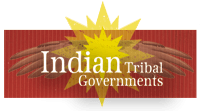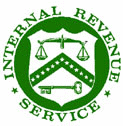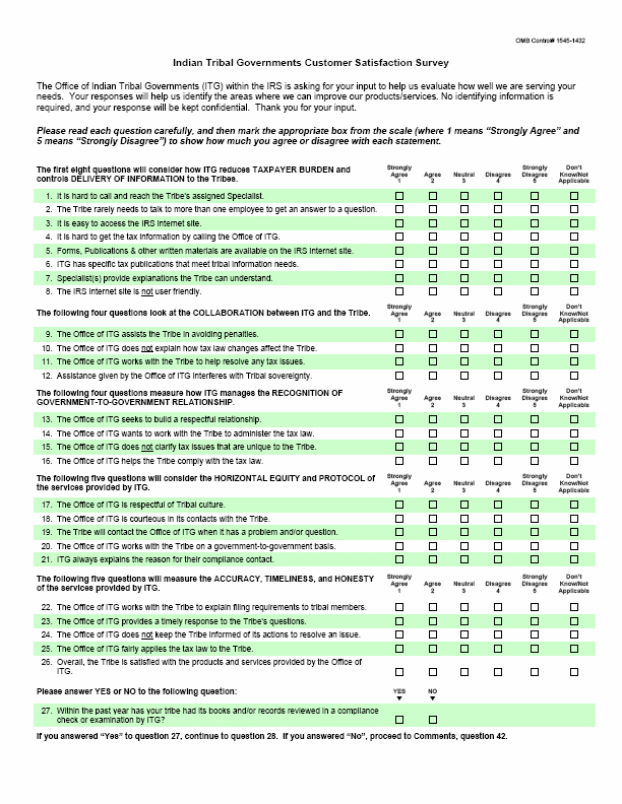Supporting Information to Survey 07-042
CS-042 Implementation Plan Customer Satisfaction Survey FY 2007.doc
Voluntary Customer Surveys to Implement E.O. 12862 Coordinated by the Corporate Planning and Performance Division on Behalf of All IRS Operations Functions
Supporting Information to Survey 07-042
OMB: 1545-1432
Customer Satisfaction Survey
Implementation Plan
Indian Tribal Governments

Compliance and Program Management Staff
May 2, 2007
Table of Contents
Table of Contents……………………………………………………………… 1
Introduction…………………………………………………………………….. 2
Methodology………………………………………………………………… 3
Privacy. Security, Disclosure, Confidentiality…………………………………. 5
Burden……………………………………………………………………………. 5
Costs……………………………………………………………………………… 6
Appendix - Customer Satisfaction Survey Materials…………………………….... 7
INTRODUCTION
Background/Overview
As part of the IRS, the Office of Indian Tribal Governments (ITG) is required to implement balanced measures for employee satisfaction, business results, and customer satisfaction. The use of measures across these three areas allows the organization to better assess the effectiveness of its programs. This Implementation Plan outlines the tasks, expenses, and actions needed to administer a Customer Satisfaction Survey of federally recognized Indian Tribal Governments. This survey is essentially identical to surveys conducted in FY 2003, FY 2004, FY 2005, and FY 2006. The results from the survey will enable ITG to continue to identify program areas where we are meeting our customers’ expectations, as well as those areas where improvement is needed. The survey feedback will allow ITG to reallocate/assign resources within our annual Work Plan to produce and/or improve those products/ services that are important to our customers.
The Office of Indian Tribal Governments (ITG) is located within the Tax Exempt/ Government Entities (TE/GE) division. The Office of ITG seeks to provide all of the services that each federally recognized tribal government needs in order to fully administer federal tax laws, and provide tribes with information they require to further their economic development without risk of federal tax concerns. The Office of ITG needs to conduct a survey of all federally recognized tribal governments to help us evaluate their satisfaction with the products and services we provide. The information collected from this survey is important for several reasons.
One, the information will allow us to measure the level of customer satisfaction espoused by our customers, and contrast current results with those obtained from similar surveys completed in FY 2003 through FY 2006. This is crucial to measuring our performance within the context of the “Customer Satisfaction” balanced measure. This balanced measure is one of the “five levers of change” identified in recent years to modernize the Internal Revenue Service (IRS). Each of the Balanced Measures is supported by three strategic goals: Service to Each Taxpayer; Service to All Taxpayers; and Productivity through a Quality Work Environment.
Two, the information will allow us measure changes in customer satisfaction from one year to the next. It will be contrasted to the results from similar surveys completed in FY 2003 through FY 2006. These annual assessments will create opportunities for us to identify areas where our customers are not pleased with our performance. This will allow ITG to modify and/or design new programs and initiatives to better address our customers’ needs.
Our research began in April 2001, when a group of our employees met in a brainstorming session to develop a list of products and services that we thought were important to the tribal governments. We broke the list down to find the positive aspects and negative attributes of each product/service and created measures. The measures were then ranked in terms of the perceived importance to the tribes. Next, we met with representatives of the Five Civilized tribes for a focus group to determine their needs and concerns.1 After studying the results of the focus group we changed the ranking of our measures, as our perception of the tribes’ needs was slightly different from their perception.
As part of this effort, we prioritized and selected the measures best suited to fit the needs of our customers. The aforementioned measures were then used to develop a customer satisfaction questionnaire. The proposed questionnaire for FY 2007 has been expanded from earlier questionnaires, as we have added additional questions for tribes that have had recent IRS examinations. A copy of the questionnaire is included in the Appendix.
Objective of Data Collection
ITG is looking to obtain feedback from our customers that will allow ITG to measure customer satisfaction with our products and services.
METHODOLOGY
We propose to employ the exact methodology utilized in the surveys undertaken in FY 2003 through FY 2006. There are 562 federally recognized Indian tribes, and the entire population will be included in our survey. Given the relatively small population, it is not practical to use a sample for the survey, since to achieve an acceptable level of confidence we would be required to survey nearly 400 of the 562 tribes anyway. There are no other known surveys or data collection efforts that exist which address federal tax administration issues for Indian tribes.
ITG possesses the expertise to administer the survey on its own, and has so demonstrated that in the four prior surveys. Therefore, we propose to utilize ITG staff to complete all necessary administration tasks. Those resources are principally present in the ITG office in Buffalo, New York, but will be supported with staff resources located in Washington, D.C. Statistical processing software will be utilized (SPSS) to scientifically analyze the response data. All survey administration costs are outlined on page 6.
In order to effectively administer the survey, ITG must complete the following tasks:
Prior to sending out the survey
Develop a survey methodology including a survey instrument
Update ITG database of contact persons for each tribe
Administering
the survey
Advertise the survey effort to raise awareness and seek support
Send a letter from the Director, Office Of Indian Tribal Governments to each tribal government alerting them to the survey and inviting their participation (see copy of letter in Appendix)
Mail out the survey with a cover letter
Mail out a reminder notice
Follow-up telephone calls
Receive surveys
Data entry for all responses
Analyze survey data
Writing a final report that 1) summarizes significant (important) findings with recommendations for products/services where additional resource expenditures are needed to improve customer satisfaction, and 2) provides a summary of significant (important) findings that were evidenced in differences across market segments.2
Based on response rates achieved in the FY 2003 through FY 2006 surveys, we anticipate an overall response rate of 50%. However, in the event that the response rate is less than 50%, the IRS will assume that all data collected from this survey is qualitative in nature, and that no critical decisions will be made solely from the analysis of data from this survey. The results from this survey are simply one piece of a larger set of information needed to assess tribal needs related to services provided by the IRS.
The results of the survey will be utilized to direct resources to better meeting the needs of ITG customers in achieving compliance with federal tax administration requirements that impacts federally-recognized Indian tribal governments.
Survey/Data Collection Dates
-
Action Item
Completion Date
Implementation Plan
May 2007
OMB Approval
July 2007
Administer Survey
August 2007
Analyze responses
September 2007
Final Report
October 2007
Privacy,
Security, Disclosure, Confidentiality
All survey data will be confidential. The cover letter will emphasize the anonymous nature of the questionnaire, and no identifying information will be collected. The responses will be stored in a locked container at the IRS offices in Buffalo, New York, and will not be made available to anyone other than those who conduct the analysis, or those in an oversight role.
BURDEN
HOURS
The total estimated taxpayer burden for this study is approximately 58 hours, assuming a 50 % nonresponse rate, a 40% response rate by mail, and a 10% response rate by follow-up telephone contacts. These figures are used only for estimating the amount of time it will take our customers to participate in the survey. Each tribe is expected to take approximately 10 minutes to complete the mail questionnaire and approximately 12 minutes to complete the phone questionnaires, as detailed below:
562 respondents
x.50 nonresponse rate
281 individuals
x 2 minutes to review survey request
562 minutes of burden
(Burden Estimate continued)
562respondents
x.40 response rate
225 individuals
x 10 minutes to complete mail survey
2,250 minutes of burden
562 respondents
X.10 response rate
56 individuals
x 12 minutes to complete telephone survey
672 minutes of burden
Total burden = 562 + 2,250 + 672 = 3,484 minutes or 58 hours
Costs3
Task |
Expense calculation |
Sub-total |
|
|
|
Draft survey, pretest, finalize survey |
Part of Balanced Measures |
(excluded) |
Office space, equipment costs, etc. |
Part of Balanced Measures |
(excluded) |
Advertising costs |
|
$1,000 |
|
|
|
Survey w/ cover letter--postage |
562 X .42 |
$236 |
Follow-up letter |
562 X .42 |
$236 |
Printing Costs |
562 X 4 x.10 |
$225 |
|
|
|
GS-7 training survey administration |
8 hours X $18 |
$144 |
GS-7 mail advance letter |
16 hours X $18 |
$288 |
GS-7 mail survey |
16 hours X $18 |
$288 |
GS-7 follow up mailing |
16 hours X $18 |
$288 |
GS-7 data entry |
16 hours X $18 |
$288 |
GS-7 follow-up phone calls |
24 hours X $18 |
$432 |
|
|
|
GS-14 data analysis |
24 hours X $44 |
$1056 |
GS-14 written summary |
16 hours X $44 |
$704 |
GS-14 implementation plan/training/OMB approval |
60 hours X $44 |
$2,640 |
|
|
|
Travel Costs |
|
$750 |
|
|
|
Total |
|
$8,575 |
Customer Satisfaction Survey (Advance Letter)
IRS
SE:T:GE:ITG
1111 Constitution Ave., N.W.
Washington, DC 20224
Dear [insert tribe’s name]
The Office of Indian Tribal Governments, within the Internal Revenue Service, has been established to provide all of the services you need in order to fully administer federal tax laws. In addition, we seek to provide tribes with information to further their economic development without risk of federal tax concerns. It is very important that the Office of Indian Tribal Governments understand your opinion of our operations. To get your opinions, we will soon send you a questionnaire to ask you about how well we are doing our job. In the next few weeks, your survey will arrive in the mail.
We hope you will cooperate with us and complete the survey, as your responses will help us better serve your needs in area of federal tax administration. We guarantee that all responses will remain anonymous. We would appreciate it if you would base your responses on your experiences with the Office of Indian Tribal Governments within the past year. Your participation is voluntary and it should take approximately 12 minutes to complete the survey
If you have any questions or comments about this survey please contact us at [Provide Phone Number] or you may write to us at the following address [Insert Address]. You can also contact us if you would like a copy of the survey results. Thank you in advance for spending your valuable time to help the Office of Indian Tribal Governments better serve your needs.
Sincerely,
XXXXXXX
XXXXX
Enclosure
INTERNAL
REVENUE SERVICE
Office of
Indian Tribal Governments
P.O. Box
227
DEPARTMENT OF
THE TREASURY
Buffalo, New York 14225

TAX EXEMPT AND
GOVERNMENT ENTITIES DIVISION
Dear
The Office of Indian Tribal Governments is responsible for the administration of federal tax laws as they relate to federally recognized Indian tribes and their entities. To assist in our efforts, we seek to partner with tribes to improve our operations to ensure that we address federal tax issues while minimizing intrusion and burden.
As part of that process, we want to secure your opinion of our operations via the attached survey that was developed with input from tribal representatives. We are asking each tribe to complete this survey, as the responses will help us better serve your needs in the area of federal tax administration. All responses will remain anonymous. We would appreciate it if you would base your responses on your tribe’s experiences with the Office of Indian Tribal Governments within the past year. In that regard, we ask that those individuals who have responsibility for federal tax issues be involved in the completion of the survey. This would most likely include financial officers, tribal administrators and accountants, casino managers, payroll officials, and similar positions. Even though several individuals may assist in the completion of the survey, only one survey form should be completed. We have identified you as the recipient of the survey form for your tribe, but ask that you include input from others who have involvement in federal tax issues. Your participation is voluntary and it should take approximately 12 minutes to complete the survey.
We have enclosed a self-addressed stamped envelope for returning the survey, and we ask that you mail the survey to us no later than August 31, 2007. The survey results will be posted to our web site at www.irs.gov/tribes, along with a summary of steps that we will take to address opportunities for improvement that are identified from an analysis of the feedback.
If you have any questions or comments about this survey please feel free to contact me at (202) 283-9800, or you may write to us at the address shown above. Thank you for your valuable time to help the office of Indian Tribal Governments better serve your needs.
Sincerely,
Christie Jacobs
Director
Enclosures:
Survey
Envelope
Proposed Script for follow-up phone calls with Tribes
Survey administrator (places call to Accounting/Finance Department within Tribe). A master sheet of contacts will be maintained to ensure that each non-respondent is contacted only once.
READ. Hi, my name is ____________, and I work for the Office of Indian Tribal Governments within the IRS. [Verify that you are speaking with a representative from the Accounting/Finance Department. If not, ask the individual to transfer you to this office and/or ask for a contact person/phone number. If the Tribal leadership prefers to designate someone else, you must work with that individual].
My office recently mailed you a customer satisfaction questionnaire to get your feedback on how well are serving your needs in the area of federal tax administration.
[You may need to remind them of who we are and what we have mailed, i.e., we are an office within the IRS that is responsible for helping federally recognized tribes meet their federal tax obligations. Our office recently mailed a questionnaire to their tribe. We want them to let us know how well we are doing our job. This feedback will help us improve the products/services we provide.]
READ. Have you returned the questionnaire to us?
=>Yes, thank them for their cooperation and mention the results will be posted on our web site (provide website address). DISCONTINUE CALL.
=>No, ask them if they would be willing to take a few minutes to answer the questions over the telephone. It should take no more than 10 minutes.
=>Yes, proceed to the questionnaire and read the directions/questions. Periodically remind the respondent of the scale. At the conclusion of the questionnaire, thank the respondent for their time and remind them the survey results will be posted on our web site (provide web site address).
=>No, ask them if there would be a better time to call back. If they refuse to cooperate over the phone, you should encourage them to complete the questionnaire that was mailed to them. Thank them for their time. DISCONTINUE THE CALL.
1 The Five Civilized tribes are located in Oklahoma.
2 ITG has identified three distinct market segments among tribes.
3 All hourly cost figures use actual salary costs for employees who will perform the tasks, inflated 25% for benefits.
| File Type | application/msword |
| File Title | October 29, 2001 |
| Author | mhhutc54 |
| Last Modified By | mdsloa00 |
| File Modified | 2007-05-03 |
| File Created | 2007-05-03 |
© 2026 OMB.report | Privacy Policy

